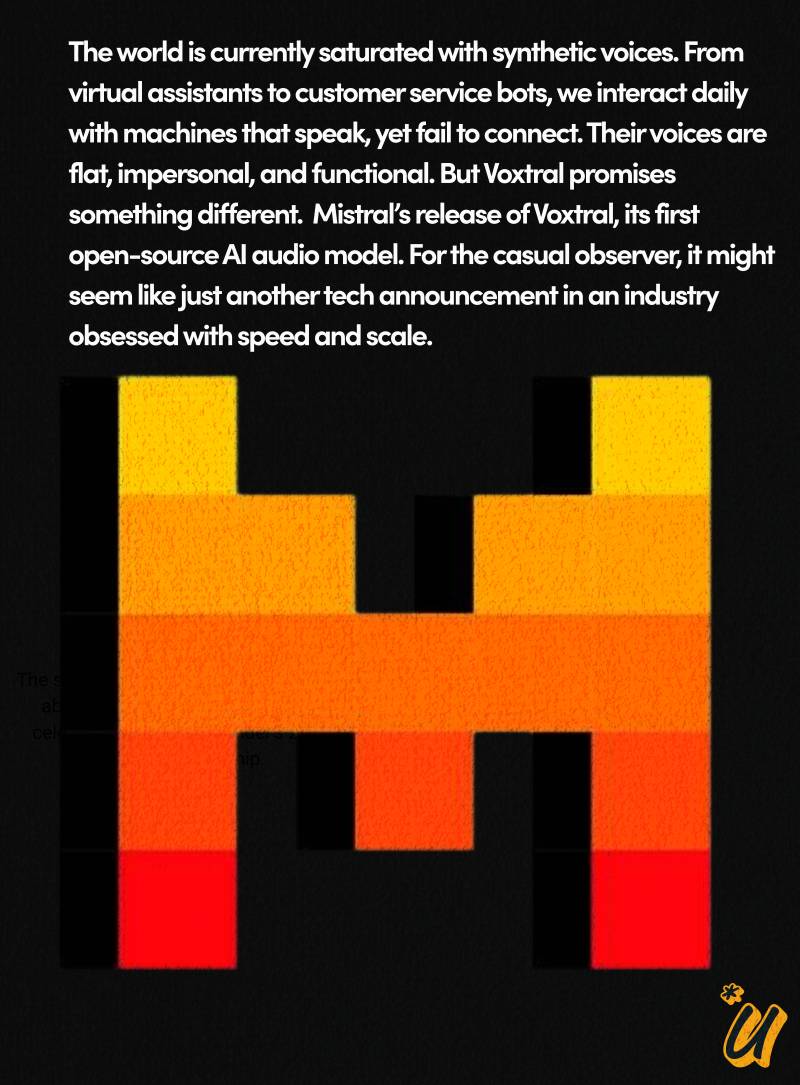In the ever-evolving world of artificial intelligence, breakthroughs are not rare, but some moments carry the weight of change. One such moment arrived quietly yet powerfully: Mistral’s release of Voxtral, its first open-source AI audio model. For the casual observer, it might seem like just another tech announcement in an industry obsessed with speed and scale. But for those who listen closely, Voxtral is not just a product. It’s a signal. A message that the future of sound, of voice, and perhaps of human-machine connection itself, is being rewritten. Mistral, known for pushing the boundaries of open-source AI, has never been content with following the pack. Their models, previously focused on text generation and language understanding, have become part of the toolkit of developers worldwide. But with Voxtral, they step into a more intimate domain: voice. Voice, after all, is not just data; it’s presence. Its identity. It’s human.
So, why does this matter?
Related article - Uphorial Podcast

The world is currently saturated with synthetic voices. From virtual assistants to customer service bots, we interact daily with machines that speak, yet fail to connect. Their voices are flat, impersonal, and functional. But Voxtral promises something different. Built on cutting-edge audio generation techniques, it doesn’t just read text aloud—it generates expressive, human-like speech with tonal richness and emotional depth. It suggests a future where machines don’t just speak to us—they speak with us.
But let’s step back. Why would Mistral, a company thriving on open AI models, choose to release such a powerful tool to the public? Therein lies the philosophy that separates Mistral from its competitors. Where many companies guard their models behind paywalls and proprietary restrictions, Mistral believes in democratization. In an industry where access often equals power, making Voxtral open-source is a bold declaration: AI should belong to everyone. Of course, open access brings its complications. Ethical concerns hover like shadows: Will such realistic voice synthesis be misused? Can it lead to more sophisticated deepfakes or impersonation scams? Mistral acknowledges these risks, but their choice to open the model to scrutiny is both a challenge and a safeguard. Transparency, after all, invites collaboration and accountability.
Behind the tech specs, though, lies a more profound narrative. Voxtral represents the convergence of two powerful human aspirations: to build and to be heard. Since the dawn of time, humanity’s relationship with voice has been deeply personal. It’s how stories were passed down long before ink met parchment. It’s how leaders stirred nations, how mothers comforted children, how lovers whispered promises in the dark. Mistral’s Voxtral doesn’t just replicate this; it pays homage to it, ushering in a world where machines might not just understand language, but embody it. This isn’t to say Voxtral is perfect. Like any newborn technology, it has its limitations. Nuance is hard to teach, even harder to synthesize. But in its imperfections lies its potential. Developers across the globe now have the opportunity to build upon it, refine it, shape it, not within corporate silos, but in shared spaces, repositories, and communities.
And in doing so, we edge closer to a reality where interaction with machines feels less like issuing commands and more like having conversations. Mistral’s Voxtral is more than code. It’s a voice waiting to be heard, waiting to be refined, waiting to be human. In releasing it to the world, Mistral doesn’t just invite us to use it; they invite us to listen. Not just to machines, but to ourselves, and to the future we are building, one word at a time.



